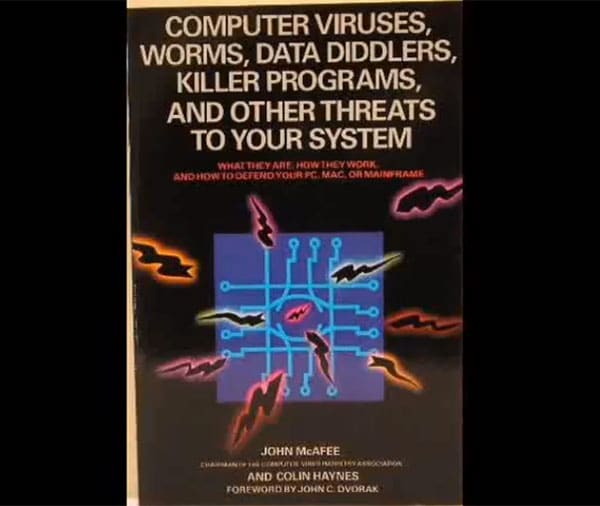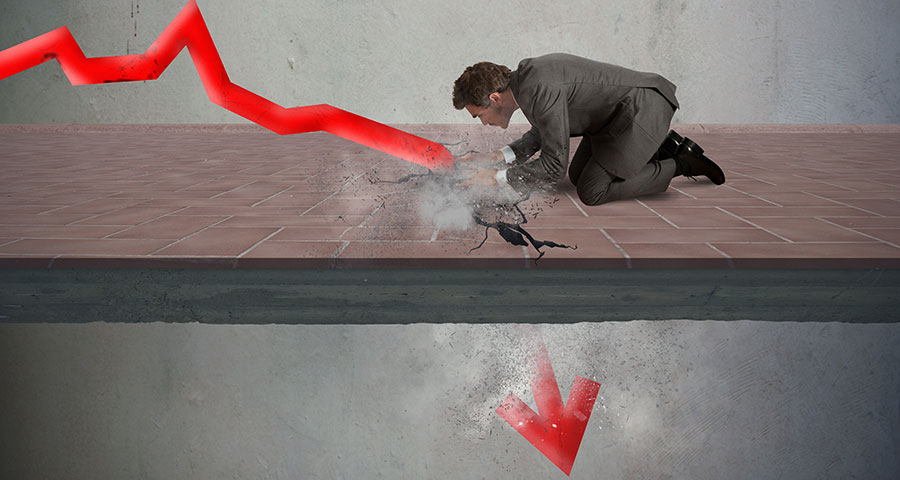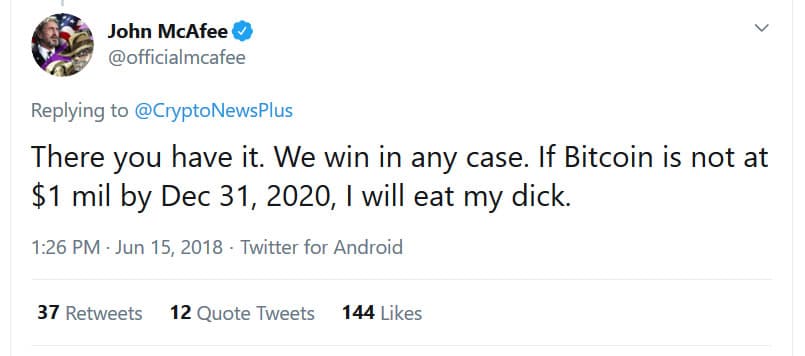It begins with a character, all I can do is trot along behind him trying to put down what he says and does.” - William Faulkner,
Any decent writer will tell you that, if you want to rustle up a good story, you’ll need compelling characters to carry it along. A strong plot is all well and good, but it’s the characters that will lift it off the page.
The world of tech has gifted us with plenty of riveting personalities over the last few decades. From steely-eyed geeks like Bill Gates and Mark Zuckerberg to pulsating super-egos in the mould of Steve Jobs and Elon Musk. We admire and abhor men like these in almost equal measure, applauding their achievements while at the same time envying them their wealth and fame. They are as ubiquitous as the brands they are famous for, and almost as hard to avoid.
 Just another day at the McAfee residence. Image via cnet
Just another day at the McAfee residence. Image via cnet Yet these guys fade to grey when compared with one man. A man who is not only the most extraordinary character in the world of tech, but has a strong claim to be one of the most colourful, notorious and downright preposterous people on the planet.
John McAfee’s story is so outlandish that it’s often hard to believe. It involves money, drugs - lots of them - guns, women, Bitcoin, multiple spells in jail and two attempts to become president. It’s often said of larger-than-life characters that if they didn’t exist then someone would have to invent them. If someone had tried to invent John McAfee, they’d have been laughed out of town.
More Than a Name
It’s a stretch to connect the man himself with the product that made him rich. After spending his early career working in numerous tech jobs all over America, McAfee found fame and fortune with the anti-virus software that still carries his name.
 A household name. Image via Mcafee.com
A household name. Image via Mcafee.comWhen compared to so many other products of Silicon Valley, McAfee software is hardly likely to get the blood racing. It lacks the sleek sexiness of an iPhone or the cutting-edge cool of a Tesla. Aaron Sorkin is unlikely to write a movie script about its creation. It runs in the background, keeps our computers safe and every few months reminds us to renew our subscriptions. All of which is at odds with the man who came up with it.
Early years
McAfee was born in England in 1945, where his American father was stationed on a US Army base. The family moved to Virginia while John was still young and he would eventually graduate from Roanoake College with a Bachelor’s degree in Mathematics.
The pivotal event of McAfee’s early life took place when he was 15. His father, a violent alcoholic who took out his frustration and unhappiness on his wife and son, shot himself dead. In a 2013 interview with Wired, McAfee admitted that ‘every day I wake up with him.’
 The outspoken type. Image via Twitter
The outspoken type. Image via Twitter Despite inheriting his father’s fondness for booze, McAfee went on to study for a PhD in mathematics in Louisiana before being kicked out for sleeping with an undergraduate student. He learnt to code while drifting through various jobs, eventually ending up developing a system for routing trains while working for the Missouri Pacific Railroad. Whilst working there he also developed a fondness for LSD and other hallucinogens.
By the 1970s he was in Silicon Valley, bouncing from job to job, all the while guzzling drugs and booze. In 1983 he quit his job at Omex, where his daily routine involved cocaine, Quaaludes and a bottle of Scotch, and found himself alone and contemplating suicide. Through a therapist, he eventually found his way to AA and got himself sober.
Going Viral
In 1986 the world’s first PC-oriented virus was developed - albeit without malicious intent - by two brothers in Pakistan. McAfee was by this time working for Lockheed and became convinced that this new threat had the potential to cause untold damage.
He started up McAfee Associates from his home and began developing software to combat these computer viruses. His success in this field was only outdone by his skills as a marketer and prophet of doom. He was so adept at whipping up the threat posed by viruses that by the end of the decade McAfee Associates was making nearly $5 million a year and his software was being used by some of the biggest companies in the United States.
 McAfee’s 1989 tome. Image via YouTube
McAfee’s 1989 tome. Image via YouTube His 1989 book Computer Viruses, Worms, Data Diddlers, Killer Programs and Other Threats to Your System set out in detail his supposed concerns about the dangers facing corporate and individual computer users.
In 1992 a new computer virus called Michelangelo appeared on the scene, which McAfee warned was capable of infecting millions of computers across the world. Sales of his software duly soared and McAfee Associates was able to go public. The Michelangelo virus did not live up to McAfee’s billing and only infected a few thousand computers, but it had helped make him rich.
Things Fall apart
McAfee left the company he had founded in 1994, before cashing in his share options two years later for around $100 million. In the wake of his resignation, he appeared to lead a relatively settled life. He advised startups, lectured at Stanford’s Graduate School of Business and started a number of other ventures, including Tribal Voice (makers of the PowWow instant messaging service). He founded a yoga retreat at his home in Colorado, wrote books about spirituality and donated computers to schools. He had, it seemed, entered a graceful retirement.
Then came the 2008 financial crash. McAfee’s fortune was supposedly slashed to $4 million and he was forced to sell off many of his assets. This appears to be the point at which his life took a turn for the weird. By 2010 he had sold up and moved to Belize, a tiny enclave on the Caribbean coast, where he bought a plot of land and began developing it. He started a cigar-making business, a coffee distribution company and, after meeting American microbiologist Allison Adonizio in a nearby resort, a pharmaceutical company called Quorumex.
 Image via Shutterstock
Image via Shutterstock The hope was that Quorumex would be able to develop a new class of antibiotics based on Adonizio’s research, which McAfee funded and promoted across the world. But McAfee’s life in Belize was becoming increasingly erratic. He began frequenting a bar in a nearby town and mingling with local drunks and prostitutes.
He ditched his girlfriend of 12 years and took up with a 16-year-old who later almost killed him as he slept. His lifestyle involved ever-increasing amounts of guns, girls and drugs. For a while, his excesses were overlooked, possibly as a result of the donations of arms and equipment he made to local police and coastguard personnel.
However, his lifestyle was attracting attention and in 2012 McAfee was arrested by units of the Belize police and charged with manufacturing methamphetamine and possession of an unlicensed weapon. Although the charges were eventually dropped, worse was to follow.
Later that same year, Belizean police were again looking for McAfee in connection with the death of his neighbour, Greg Faull, who was found shot dead and apparently executed, at his home further down the beach. McAfee and Faull were alleged to have fallen out over McAfee’s dogs, which were later found poisoned, and other ‘erratic behaviour.’
 McAfee and his retinue in Belize. Image via Wired
McAfee and his retinue in Belize. Image via Wired McAfee managed to evade arrest and flee to Guatemala, all the while denying any part in Faull’s death. He reasoned that he was fleeing from the police because he believed they wanted to kill him and suggested that whoever killed Faull may have been targeting him instead.
In 2016 Gringo: The Dangerous Life of John McAfee was released by Showtime. In the film, directed by Nanette Burstein, numerous allegations were made against him regarding his time in Belize, many of which McAfee seems to have made little effort to deny. Among the more serious are the claims that he personally hired thugs to torture and kill Faull, while Adonizio believes that he drugged and then sexually assaulted her before she was able to escape from his compound.
Sent Packing
McAfee was eventually arrested by police in Guatemala, after Vice magazine inadvertently printed a photo of him there which still had GPS metadata embedded in it. After suffering heart problems while in custody, McAfee managed to avoid extradition to Belize and was instead deported back to the United States.
Any idea that a move back to the States might temper the lunacy of McAfee’s existence didn’t last long. He had long been vocal about his disdain for the anti-virus software he had invented and the company that still operated under his name. In 2013 he posted a video to YouTube titled, ‘How To Uninstall McAfee Antivirus’ which showed him frolicking with scantily-clad women, brandishing guns and snorting bath salts.
 Yes, this actually happened. Screenshot via YouTube
Yes, this actually happened. Screenshot via YouTubeFurther arrests followed, for possession of a firearm while intoxicated, driving while under the influence and suspected possession of high-calibre weapons and ammunition. The latter charge landed him and his entourage a four-day stay in a Dominican jail. Meanwhile, the suspicion that he had been involved in Greg Faull’s death refused to disappear, as a court in Florida upheld a wrongful death lawsuit issued against him and instructed him to pay Faull’s family $25 million in compensation.
Faced with all this controversy, McAfee took the natural next step for any wealthy American with a reputation for dishonesty: he decided to give politics a try.
McAfee for President?
A common trait amongst many wealthy Americans (including their current president) is an intense dislike of paying taxes and McAfee is no exception. This was one of his main reasons for seeking the Libertarian Party’s presidential nomination in 2016. He also stated that one of his main policies would be the widespread introduction of cryptocurrencies, a filed he was becoming increasingly more interested in.
 Maybe not White House material. Image via Business Insider
Maybe not White House material. Image via Business Insider Perhaps sensing that its reputation would not necessarily be much enhanced by fielding a candidate as unhinged as McAfee, the party’s voters placed him third in the race. It’s tempting to think that he might have had more luck with the Republicans, who saw nothing wrong with nominating someone who clearly had plenty of issues himself.
McAfee tried again to secure the Libertarian nomination earlier this year, but eventually ended up tilting for the vice-presidential nod, once again coming third. Proof perhaps that those Libertarians aren’t quite as crazy as they’re made out to be.
McAfee and crypto
It’s no surprise to find someone with McAfee’s dislike of the IRS and the idea of taxation in general getting excited by cryptocurrencies. His support for the technology has been every bit as full-on and erratic as every other aspect of his life.
Take, for example, his bullish assertion in 2017 that Bitcoin would reach $500,000 by December 2020 and, if it didn’t, he would ‘eat my dick on national television.’ The following year he was at it again, this time predicting BTC to be at $1,000,000 instead. His dick is apparently still very much on the table, so to speak.
 The Appendage Bet. Image via Twitter
The Appendage Bet. Image via TwitterWith Bitcoin clearly unlikely to get anywhere near either figure, it’s not all that surprising to see that he recently distanced himself from those claims.
But Bitcoin hasn’t been the only recipient of McAfee’s attention. Over the past few years he has promoted a number of crypto projects, though he now stands accused by the SEC of failing to disclose his interests in them. He was involved in developing and promoting the Ghost ecosystem, which included a privacy coin and an exchange, but left earlier this year. In parting, he labelled Ghost CEO Josh Case ‘an idiot.’ That was until yesterday when he announced on Twitter - from a Spanish jail cell - that his ‘feud with management was over’ and he was back on board.
It was also revealed last year that he charged $105,000 per tweet to promote crypto products, though many who paid for his services declared themselves to be unhappy with the results. His bitcoin mining concern, MGT Capital is also suspected of running a pump and dump scheme, whereby coins were heavily promoted and sold off when the prices rose as a result. The actions of the SEC have since served to temper McAfee’s freewheeling promotion of anything that will cough up a fee for the (dubious) privilege.
Arrest and Imprisonment
The latest twist in the tale came earlier this month, when McAfee was arrested in Spain while trying to board a flight from Barcelona to Turkey. He is being held in jail there, pending extradition to the US on charges of tax evasion, concealing assets and of failing to file tax returns. He will also face those charges being brought by the SEC.
 McAfee during one of his earlier stays in the big house. Image via cnet
McAfee during one of his earlier stays in the big house. Image via cnet If convicted of all the charges then he could face up to 30 years in jail - not an altogether optimistic outlook for a 75-year-old. He is still an active presence on social media, posting constant updates from his cell as he awaits extradition. He compares himself to Julian Assange, rails against the US government and muses on the vicissitudes of life behind bars.
It will take more than jail to keep John McAfee quiet and there are doubtless several more chapters of his extraordinary story still to be written. Just be sure to give him a wide berth if you ever see him coming down the street.
Conclusion: Only in America
Looking back over McAfee’s story to date, it seems incredible that he has been able to get away with so much over the years. In the wake of his flight from Belize and the allegations of murder that continue to hang over him, it’s bewildering how he was able to return to the United States and simply carry on living his life in the public eye.
His bid for the presidency needs to be seen in some sort of context: he was, after all, never likely to secure the nomination of a party that many perceive as little better than a lunatic fringe. But it still makes a sobering point about how rich, morally dubious men with shady pasts can still aspire to be the supposed leader of the free world. And, in Donald Trump’s case, actually succeed.
To many of McAfee’s one million Twitter followers, he is a hero who is being punished for standing up to power. This is remarkably similar to how many view Trump, ignoring his dismal record of sexual improprieties, tax evasion and much more besides.
Both men are examples of how sowing fear, uncertainty and doubt can open up paths to wealth and power. McAfee did it to sell software, Trump is pinning his hopes on it to stay in the White House. Let’s hope that’s not all it takes to succeed in this world.



